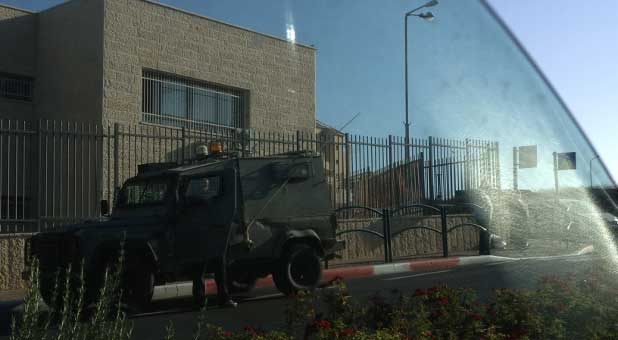As summer vacation drew to a close, one afternoon I found myself sitting with my eight-year-old son, watching cartoons on TV and taking a break from playing outside. I have no idea what cartoon he was watching, and admittedly was not paying much attention to it, checking emails instead, but my son was paying close attention, and I learned a lot from this.
“That kid’s stupid, right Abba?” he asked.
With him being the sixth kid, we are beyond the “stupid is not a nice word,” age. So, rather than focusing on his language, I was puzzled what he was talking about. “What kid are you talking about?” thinking he meant a real person. “Where?”
“That one, on TV,” he answered without hesitation.
For an instant, I thought he might have been suffering from too much heat, talking about a cartoon character on TV and assessing it to be stupid. “What do you mean? Why is he stupid?” I asked, curious and puzzled.
“He opened that box,’ using the Hebrew phrase for ‘suspicious object.’ If it were a bomb he could have been killed.”
Immediately I understood what my son was talking about. He learned something just by living in Israel, something I never remember teaching him. Any abandoned object could be a “suspicious object” and any “suspicious object” could be a bomb.
Israelis know this intuitively from no shortage of incidents, especially before suicide bombers began using their bodies as suspicious objects, where explosives have been left masked in things as large as duffle bags near a bus station, to as small and mundane as coke can on the street.
The response to finding an ownerless suspicious object is to call security that will arrive immediately, cordon off an area, and use various high tech robotic means to assess the nature of the object, blowing it up if needed. Certainly, what my son learned and shared with me, albeit indirectly, is that one never opens and explores a suspicious object independently. In his mind, and from his worldview, doing so was stupid. It’s hard to argue with.
Although the cartoon he was watching was dubbed in Hebrew, it was an American cartoon. I tried to explain that to him and that in America, people don’t think as much about suspicious objects as we do in Israel. I’m not sure he understood, but it seemed to satisfy him enough at the moment. Mostly, I was proud that he knows what a suspicious object is, and what to do.
This is the same son who, two years earlier, came home from school after a national earthquake drill to share with me the difference between what one does in case of an earthquake, in case of a rocket attack or in case of a terrorist in the school. I’d never thought I’d raise kids to be so “sophisticated” so young, but am glad that they know what to do, as much as one can be prepared, if any of these incidents occur.
It’s one of the mixed blessings about living in Israel. Balancing the challenges of raising children with very real threats around us, and the awareness that this is far too normal, so they need to be aware of their environment in a way much different than in most of the rest of the world.
I remember when studying in Israel in the 1980s there was no shortage of road closures, buses evacuated, and bags being checked going into grocery stores all because of, or to prevent, suspicious objects from exploding. Even toy dolls in the wrong place at the wrong time became suspect. In that era, terrorists also sabotaged Israeli exports not only to harm people, but also to terrorize countries that imported Israeli products.
While the advent of suicide terrorists changed the dynamic in untold ways, leaving more than 1,600 Israelis killed a decade ago mostly from suicide terrorists, the concern over suspicious objects still permeates Israeli society. Mostly these create an inconvenience, like the times I’ve sat in traffic for hours waiting for sappers to clear an area. We still have bags checked while walking into grocery stores, malls and the like, and cars checked driving into most public parking areas.
But sometimes these suspicious objects are actually dangerous—like the suitcase that exploded outside a crowded bus stop in Jerusalem a few years ago, killing a Christian tourist from Britain and injuring many others. I’ll never forget the story of the woman I helped to a bus in the north to come to Jerusalem. She forgot to retrieve her small suitcase from the cargo space beneath the bus, so it was treated as a suspicious object and blown up.
This year, on the second day of school, I was dropping off my kids and noticed a lot of traffic and security people leaving my neighborhood. I didn’t give it a second thought. Police often help out directing traffic and making sure that kids arrive safely the first week of school.
But coming back into my neighborhood, traffic was worse than ever before. The mayor was outside informing people in all the vehicles waiting that a suspicious object had been found in the school at the corner—my daughter’s school—the one at which I dropped her off 10 minutes earlier.
My heart skipped a beat and I knew it was one of those “Only in Israel” moments. I knew that authorities had everything in control, kids were outside waiting patiently under supervision of teachers, administrators and army and police. But still, it was unsettling to think of a school being targeted.
An hour later, an automated message went out to all the residents of our neighborhood, on our cell phones and home phones—all clear. As much as my heart skipped a beat an hour earlier, I breathed a huge sigh of relief. A neighbor witnessed and filmed the scene when the suspicious object was detonated, a very inauspicious way to start the school year.
This is the same week that Israeli security uncovered a plan by two young Palestinian Arabs connected to Hamas to use their working in a popular Jerusalem mall to plant a bomb just for such an attack. Other than this underscoring our reality here, it is ironic because one of the reasons given for relative lack of security at this mall is that its’ stores and restaurants are popular with Arabs and Jews, and many Arab work there as well. Surely, the thinking goes, they wouldn’t kill their own. But one doesn’t have to look too far for the plethora of examples where that’s in fact commonplace.
Part of living among neighbors who don’t accept our right to be here, and who sanctify death over life, is an ongoing apprehension that a forgotten backpack in a school yard on the second day of class could be a bomb. We are also aware that anything not even related to us in one of our neighboring countries could spill over and threaten Israeli lives, or escalate to an all-out battle.
But the alternatives, not to live here, or not to live period, are not acceptable. So, we will continue to live here, teach our kids to be aware of their environment, learn with them from these lessons, pray and be grateful for God’s continued protection, and always choose and sanctify life.
Note: This column also appeared in a recent online edition of the Jerusalem Post.
Jonathan Feldstein is the director of Heart to Heart, a unique virtual blood donation program to bless Israel and save lives in Israel. Born and educated in the U.S., Feldstein emigrated to Israel in 2004. He is married and the father of six. Throughout his life and career, he has been blessed by the calling to fellowship with Christian supporters of Israel and shares experiences of living as an Orthodox Jew in Israel. He writes a weekly column for Charisma’s Standing With Israel.































































